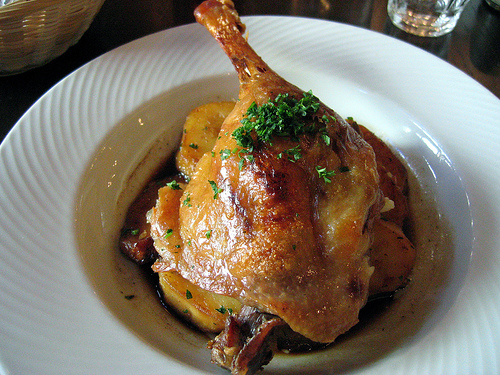By Contributing Food Editor Jared Levan
Dear Californians,
As I’m sure many of you aware, you recently lost the right to purchase foie gras (since, approximately July 1st). While the ban was targeted specifically at the sale of the delicious end product that is foie gras, it was apparently so “broadly” written that it may also carry over to all skin, feather and other by-products that come from duck raised for foie gras production.

So what’s the big deal? Well the reason that animal rights activists are so against the sale of foie gras is, not surprisingly, focused on the methods used to produce it. Before you can sell foie gras, you’ve got to first fatten up a duck or goose to the point where the animals liver has fattened and become engorged from such a gluttonous diet. The problem is, this typically means that ducks are force-fed copious amounts of feed to “speed up” the process and ensure the desired end product.

(Foie Gras Terrine)
Regardless of the controversy, restaurants, chefs and consumers across California are still finding ways to get their foie gras and eat it too…so did this ban really accomplish anything at all? What makes this cause more prominent than many other animal-rights encouraged actions and why did this particular cause get it’s own ban?

(Duck Confit)
If consumers across the nation…save the world, will continue to find ways of buying and consuming foie gras and other by-products of the fattening process, than that means culinary professionals will still need to be trained in how to cook with and serve said offering. That being said, how will folks be trained if it’s illegal for the schools in which they learn are not permitted to provide it’s students with the correct supplies?

(Foie Gras Mousse)
My point, summarized below, is:
1. Schools can’t properly teach technique with merely “theoretical” knowledge of any food so the ban severely hurts the culinary community.
2. While I don’t/won’t miss trans fats, or +16 oz. sodas, these bans on food focus more on stopping people from being stupid, when the real issue is education. Instead of banning large drinks, offer more inexpensive alternatives, offer more incentives, or just educate them (and I don’t mean with those ads that look like a cup brimming with fat).
3. Let people make their own choices. If you don’t support inhumane treatment of animals, then only eat foie gras from humanely raised producers…no one is forcing you to eat it.
4. People are always going to find a way around the law–whether it’s blocking the sale of alcohol or animal products. Rather than making it illegal to buy/sell, which will promote unlawful conduct, regulate it’s production standards to appease those who so staunchly despise it.
5. I’m glad I live in New York where I can still buy duck fat–it’s a staple in my kitchen, one I’m not willing to give up anytime soon.
Love,
Jared


Yes, it’s interesting that they’re prohibiting products of force-fed animals being sold to people who force-feed themselves.
I don’t know that I agree with the ban of the product entirely – as you said, people will find a way around it and I also disagree with the politics of the government “saving us” from making unwise choices.
However, it does force us to look at the issue. Which to me, isn’t as easy as “let people make their own choices” because I happen to believe the duck should have a choice, and force-feeding and fattening its liver is inherently inhumane. Therefore, there are no “humanely” raised foie gras ducks. This product is from the same country that drowned and ate songbirds as a delicacy – I don’t trust the humaneness of these products anymore than our current factory farming techniques. The methodology and thought processes that enable us to use animals in this way are outdated and uncivilized, and so maybe the end product is as well…
Just my opinion, of course! 😉
I’m a big believer of keeping this legal but just taxing the eff out of them. Why not just put a tax on +16oz drinks & foie gras? Eff it, make it 10%. Still legal, raise funds.
oh theres also humane way to make foie gras
http://www.ted.com/talks/dan_barber_s_surprising_foie_gras_parable.html
Do the ducks actually dislike the process?
Ok, is this wrong of me to say… but I really fancy some foie gras now, I blame you for posting such delicious looking food pictures. On a serious note I do think the mass production methods for producing this product is cruel, but that said so are almost all the process used for mass producing food. There are simply too many of us to stick to kinder more gentle traditional ways of farming, where do you draw the line?
i am shocked at your responses. such incredible insensitivity to a living, breathing animal. torturing and killing them for your gluttonous enjoyment. you should be so ashamed.
@Sybaritica, I suppose it depends on who you ask. The foie gras farmer will say they like it. The animal rights activist will say it’s torture. I believe that the gavage method is cruel but it is quick at least. In my opinion, the duck or goose does not like it as it is not natural, but I can’t speak duck, so it’s hard to say.
Leia’s link to the TED video showed an excellent non-gavage way of obtaining foie gras, although since I don’t eat land animals, I still object. But in that particular instance, the geese are living almost as if they were wild and I think they must enjoy being so free. I love that.
You yuppies are ridiculous. Your commodity fetishes are gross/stupid and you think you are soooooo cultured.
(I would just like to clarify that the above is a different Rose from the other two “Rose” comments, because I am the Rose with the first two comments.)